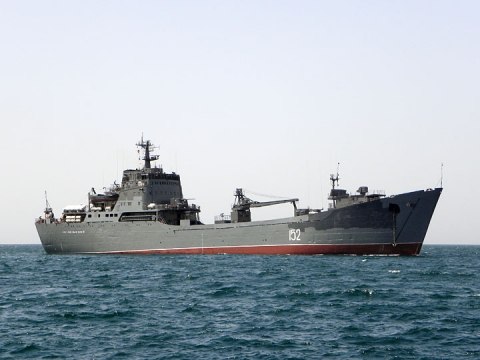The Russian Navy has just concluded its largest exercise in the Mediterranean in many years. The ships involved represented all three of Russia's European fleets and included the missile cruiser Moskva, the Udaloy-class destroyers Marshal Shaposhnikov and Severomorsk, the Yaroslav Mudriy and Smetliviy frigates, six large landing craft (the Kaliningrad, Novocherkassk, Alexandr Shabalin, Saratov, Nikolai Filchenkov, Azov), two submarines (one nuclear and one diesel-powered) and various support vessels. The total number of ships involved was over 20. In addition to the ships, the exercise included at least 20 aircraft. The exercise is being overseen by two senior MOD officials, deputy chief of the General Staff Aleksandr Postnikov and deputy Chief of the Navy Staff Leonid Sukhanov.
The timing and location of the exercise, as well as the heavy representation of amphibious ships, have raised questions about the Russian Navy's goals in the Mediterranean. To my mind, this is another case of the Russian military trying to kill many birds with one stone. During the second half of the Cold War, the Soviet Navy had a virtually constant presence in the Mediterranean. Its squadron had a number of simultaneous tasks — ensuring the security of critical sea lanes to the Black Sea, deterring the United States Navy, ensuring continued access to the Suez canal for Soviet shipping, and engaging existing and potential allies in North Africa and the Middle East were probably the most significant of these. The Russian military has long sought to restore its presence in the region and has in the last 5-6 years taken numerous opportunities to send ships to the region to engage in exercises and conduct port visits. This exercise, first and foremost, is simply an expansion of this effort.
Second, the exercise is designed to prepare the navy for possible future operations in Syria. Discussions about the possibility of the Russian fleet seeking to have a deterrent effect on potential US or NATO intervention efforts in the Syrian civil war seem to me rather misguided. The assembled Russian forces are no match for the NATO forces that would be assembled in the region in the event of an intervention. The Soviet navy was always exceedingly cautious to only get involved in conflicts (even just with show of force operations) only in circumstances where the balance of forces was favorable. While those days were a long time ago, the current leaders of the navy were trained in that tradition and are unlikely to get involved in adventures of this type. Furthermore, the composition of the task force indicates that the navy wants to be prepared for a potential evacuation scenario. Such an evacuation may be focused on Russian citizens living in Syria, or (less likely) it may be part of a bid to rescue defeated Alawite leaders from their coastal stronghold down the road. The presence of a large number of surface combatants may be an indication that the navy wants to be prepared to undertake such an evacuation even in circumstances where its ships may come under fire from hostile forces (presumably the victorious Syrian rebels).
The final goal, for the navy, is just to increase preparedness. The Northern Fleet likes to send its ships to exercise in the Med during the winter months. The weather is nicer, allowing for more complicated maneuvers. Official reports indicate that the exercise covers a wide range of naval operations, including counter-piracy and convoy operations, ship defense from small boat attacks, coordination with both naval and long-range aviation, ASW, opposed amphibious landing, and search and rescue. The navy has conducted exercises in the Med pretty much annually since 2008. The fact that this is the largest is in part a reaction to the geopolitical circumstances in the region and in part an indication that the Russian navy is gradually gaining confidence and increasing its capabilities.
Dmitry Gorenburg is a Senior Analyst at CNA blogging for PONARS Eurasia on military and security affairs in Russia and Eurasia. This comment is also available on Russian Military Reform.










